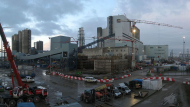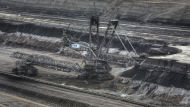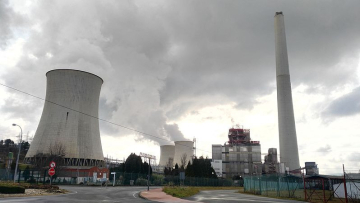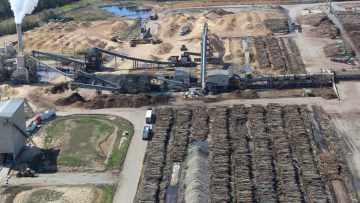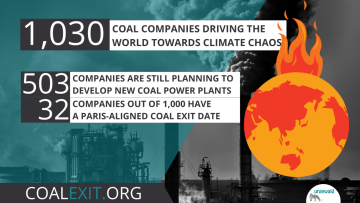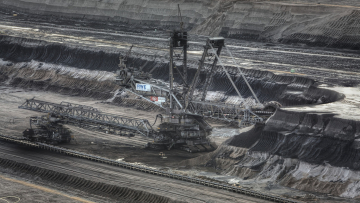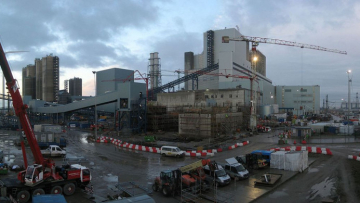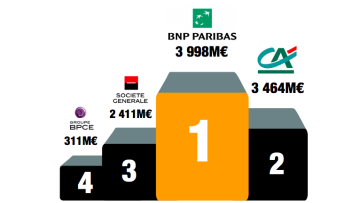Company – On record
This profile is no longer actively maintained, with the information now possibly out of date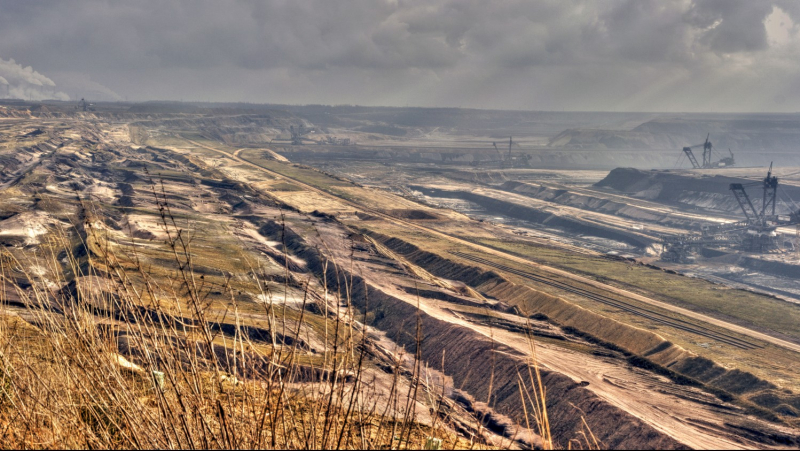
Company – On record
This profile is no longer actively maintained, with the information now possibly out of dateWhy this profile?
RWE is Europe's biggest single emitter of CO2 and therefore contributes to the acceleration of climate change. It is also threatening a socially just energy transition in one of Europe's most important economies. The company is converting its two coal power plants in the Netherlands to burning wood.
RWE is burning up to 2.6 million tonnes of wood pellets a year in its two coal & biomass power plants in the Netherlands. The company wants to fully convert those plants to 7.5 million tonnes of wood pellets annually, claiming that it will be able to capture most of the CO2 emitted in order for it to be sequestered. However, burning woody biomass emits more CO2 per unit of energy generated than coal, and the demand for wood pellets is accelerating the destruction of wildlife- and carbon-rich forests.
What must happen
Banks should avoid providing financial services to RWE, as coal-fired power stations represent 30% of its electricity generation and the total operating capacity of its coal plants is about 11GW. RWE’s annual coal production is 84.8 million metric tons. RWE also continues to invest in new coal power and plans to keep its coal power stations operational till 2038, as well as converting coal power plants to burning wood which is falsely labeled as "renewable". By doing so, RWE fails to align its business model with the goals set in the Paris Climate Agreement. (See also the Principles for Paris-aligned Financial Institutions).
Banks should also avoid financing RWE’s biomass conversion and carbon capture projects. The company’s conversion of coal-fired power plants to wood-pellet-burning power plants does not reduce their disastrous climate impact, and is linked to unsustainable forest destruction. This provides additional grounds for banks to exclude all financial services to RWE.
| Sectors | Coal Electric Power Generation , Biomass Electric Power Generation, Coal Mining, Commodities Trading, Nuclear Electric Power Generation, Solar Electric Power Generation, Wind Electric Power Generation |
| Headquarters |
|
| Ownership |
listed on Düsseldorf Stock Exchange & Frankfurt Stock Exchange
RWE's shareholder structure can be viewed here. |
| Subsidiaries |
RWE Generation – Germany
RWE Power – Germany RWE Renewables – Germany RWE Supply & Trading – Germany |
| Website | http://www.rwe.com |
RWE is a large German energy company, founded in 1898, and is active in the generation, trading, transmission and supply of electricity and gas. RWE's coal power plants are located in Germany, the United Kingdom and the Netherlands, where RWE operates two coal & biomass power stations: the Amer Power Station and the Eemshaven Power Station. Since the middle of 2019, RWE has been co-firing increasing amounts of wood pellets with coal in both plants. At present, RWE is burning up to 2.6 million tonnes of wood pellets a year in both plants together. However, the company wants to convert them to 100% biomass (7.5 million tonnes a year), claiming that it would be able to capture the CO2 emitted, even though the carbon capture from biomass combustion has not been proven at scale and RWE has carried out no trials. If both plants were fully converted to biomass, they would burn up to 7.5 million tonnes of wood pellets a year.
The Amer Power Station is currently burning around 1 million tonnes of wood pellets a year, but RWE wants to scale this up to 2.5 million tonnes, ahead of a full conversion. RWE’s nature permit for increasing biomass burning to 2.5 million tonnes is on hold subject to a court ruling on a challenge by the Dutch NGO Mobilisation for the Environment. The Eemshaven Power Station has been granted a permit to co-fire 1.6 million tonnes of pellets annually.
Actual figures as to how many pellets RWE has been burning over the past year have not been published. More concerningly, RWE refuses to disclose any information as to where the pellets it burns in the Netherlands come from. The information available to the public comes from trade statistics. Pellets imported to the Netherlands - most of which go to RWE - come from countries and regions where pellets are routinely made from trees that have been clearcut in biodiverse forests, and (in the case of Vietnam) from tree plantations established at the expense of rainforest destruction. More information about RWE pellet sourcing is available here.
Impact on human rights and communities
Resettlement Lignite open pit mines have swallowed entire villages and RWE has resettled 41,000 people since the 1940s. The villages are mostly resettled a few kilometers further including houses, churches and cemeteries. The Garzweiler mine - although in operation since 2006 - has caused the resettlement of six villages and the expansion threatens the existence of 12 villages that are home to 7,600 residents. Demolition of the first four villages (Unterwestrich, Oberwestrich, Kuckum and Beverath) is scheduled to begin in 2023. A number of villagers have formed an alliance under the name of 'Menschenrecht vor Bergrecht' and is resisting RWE's claim on their land in court. In addition, the villages of Mannheim and Morschenich will be resettled before 2022 and 2024, respectively, to make space for the Hambach open-cast mine which has already resettled four villages.
Pollution Coal and wood biomass power plants emit similar levels and set of pollutants as each other, which are both linked to severe health impacts, including asthma, cancer, heart and lung ailments. In addition, the production of wood pellets is associated with air pollution and wood dust pollution. Long-term exposure to wood dust is linked to allergic and non-allergic respiratory and nasal disease and with dermatitis as well as two rare cancers. Poor wood dust management has been observed and reported in relation to plants owned by RWE's suppliers Graanul Invest, Enviva and Pinnacle Pellets. Pinnacle Pellets have also had several explosions and fires at plants, resulting in injuries and even deaths of workers.
Impact on climate
Emissions from fossil fuels RWE is Europe's biggest single emitter of CO2 with 69 megaton of CO2 emissions in 2020 and therefore contributes to the acceleration of climate change. In 2020 gas accounted for 35% of RWE’s generation capacity, followed by renewables (25%), lignite (21%) and hard coal (5.5%). In addition nuclear had a share of 7% and 6% of pumped storage and batteries. Besides the burning of gas, hard coal and lignite, RWE is involved in mining lignite which is the dirtiest of fossil fuels. RWE mines about 90-95 million tons of lignite each year in its three open cast mines in North-Rhine Westphalia: Garzweiler 30-35 million tons; Hambach 40 million tons and Inden 20 million tons. The company also runs several lignite power plants of which are among Europe's most polluting power plants.
Emissions from biomass RWE has started transforming its two coal power plants in the Netherlands into plants that run on wood biomass, which has been falsely labeled as "renewable". Burning biomass from forests creates more carbon emissions than burning coal, per unit of energy, and the increased carbon dioxide concentrations persist in the atmosphere for decades. In addition, forests offer crucial protection from extreme weather events such as floods and droughts that are becoming increasingly common due to climate change, but the demand for wood pellets for energy is driving forests across the world to be cut down.
Climate risk lawsuit In November 2015 Saúl Luciano Lliuya, a Peruvian farmer and mountain guide, filed a lawsuit against RWE with the help of Germanwatch calling on the company to take responsibility of protecting his family and property from flooding brought on by climate risks. RWE's enormous emissions threaten Raúls family, property and a large part of his home city of Huaraz.
Impact on nature and environment
Threats to forests Since 2015 the Hambach mine has become a focus of the activist alliance Ende Gelände who use civil disobedience to stop the lignite mining. RWE's Hambach mine threatens the 12,000 year old Hambacher forest, home to an oak-hornbeam woodland and 142 species of birds, 10 species of baths and rare animals protected under EU law, such as the middle spotted woodpecker, the spring frog or the dormouse. Today only 10% of the original forest is left and RWE plans to clear 70ha a year to enable their Hambach mine to expand. Activists have occupied the forest and try to stop the clearance by means of tree houses.
Destructive forestry practices for biomass supply All of the pellets burned in Dutch coal power stations of RWE are imported, but RWE refuses to disclose where its pellets are sourced from. What is known from two of their suppliers is that the company has supply agreements with the world's three biggest pellet producers: Enviva, Graanul Invest, and Pinnacle Pellets. It is well-documented that each of these companies routinely source whole logs from clearcut biodiverse, native or old-growth forests for their wood pellets. Through destructive logging practices, these companies are contributing to the destruction of irreplaceable forests and increasing greenhouse gas emissions.
Impact on pandemics
Wood biomass is associated with high rates of deforestation as well as monocultures of various crops. There is a growing body of evidence that shows the connection between deforestation and an increased risk for disease outbreaks and pandemics. For example, monocultures like eucalyptus plantations reduce biodiversity leaving species like rats and mosquitoes, which are more likely to spread dangerous pathogens, to thrive. This biodiversity decline results in a loss of natural disease regulation and poses a risk for human, animal and environmental health.
In March 2022 RWE renewed its USD 5.4 billion credit facility with a consortium of 25 banks, one part (USD 2.175 billion) maturing in April 2026 and a second part (USD 3.27 billion) maturing in March 2024. The credit facility was originally established in April 2019 when a consortium of 27 banks financed the facility (RWE press release). See below for more details on banks involved.
In January 2020 RWE issued EUR 750 million in bonds (Cbonds.com). Banks involved were Banco Santander, Crédit Agricole CIB, ING, LBBW, Société Générale and UniCredit. See below for more details.
Between 2014 and 2017 33 financial institutions loaned a total of USD 5.510 billion and provided a total of USD 3.055 billion in underwriting services to RWE. These are specified below.
Germany: Police begin eviction of Hambach forest activists
The Lure of Lignite
The Case of Huaraz: Saúl versus RWE
2022
2022-03-31 00:00:00 | Enviva announces 15-year MOU with European customer, forecasts significant growth for 2022
RWE has signed a new sourcing agreement with Envia, doubling pellet purchases from them. The contract with RWE has a tenor of five years and is for the delivery of 90,000 MT during 2022, increasing to 180,000 MTPY for 2023 through 2026.
2019
2019-04-26 00:00:00 | RWE cancels plans for BoAplus project at Niederaussem site
In a press release, RWE has stated that it will focus on electricity generation from renewable energy sources. Consequently, the company will no longer invest in new built of coal-fired power stations. Plans for the BOAplus project, a lignite power station at the company’s site in Niederaussem in Germany, have been cancelled.
2019-01-28 00:00:00 | Germany's coal phase-out date of 2038 comes to early according to RWE
Germany's coal commission recommends that the country should phase-out coal by 2038, with fixed reductions in power-plant capacity by 2022 and 2030. These targets are clearly not in line with the 1.5 degree target of the Paris Climate Agreement. RWE however, says the 2038 end date is too early for the company.
2018
2018-09-10 00:00:00 | RWE's controversial Hambach coal mine faces protest
RWE announced to clearcut the forest to enlarge the Hambach mine despite the negotiations happening in the coal commission for a coal phase out. The Hambach forest is occupied by activists that are resisting the clearcutting of trees and living in different villages of tree houses. Environmental NGOs declared that clearcutting the forest during coal-phase out negotations would endanger their participation in the coal commission. After the regional higher court announced to decide on the legal challenge of BUND to suspend the clearcutting season for enlargening the Hambach mine, RWE agreed yesterday to a standstill agreement until the verdict is out meaning that RWE is not allowed to clearcut the forest until Oct 14. But despite doing so RWE took advantage of the unclear situation in the previous days to destroy the ground structures of the occupation, sweeping the ground of the forest like a kitchen floor from everything that activists needs for daily subsistence.

